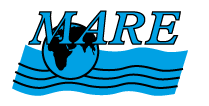Lawrence Hall of Science/UCB
2005 University of California, Berkeley Educational Initiatives Award
In 2005, the Communicating Science college course at the Lawrence Hall of Science was awarded the UC Berkeley Educational Initiatives Award. The Educational Initiatives Award is presented annually to a department or unit on the Berkeley campus in recognition of distinctive and innovative contributions to undergraduate education. Designed to complement the campus' Distinguished Teaching Award for individual faculty, the Educational Initiatives Award is presented to a department, unit or group of faculty that has created an outstanding program or initiative that has had a sustained impact upon undergraduate education and can serve as a workable model for others on campus.
The Communicating Science course started in 1997 as "Communicating Chemistry," a collaboration between Chemistry Professor Angelica Stacy and former Lawrence Hall of Science staff member Jennifer Claesgens. In subsequent years, the course was expanded to include other scientific disciplines and faculty, and additional Hall staff, including Lynn Barakos and Kevin Beals. The Center for Ocean Sciences Education Excellence California (COSEE CA) at the Hall created the sister courses Communicating Ocean Sciences (COS) and Communicating Ocean Sciences to Informal Audiences (COSIA) for undergraduate and graduate students in Integrative Biology, Earth & Planetary Sciences, and Geography. The COS and COSIA courses are now taught in more than 25 colleges and universities across the nation.
Communicating Science and its sister courses are consistent with the Hall's approach to instruction by modeling good teaching and focusing on important pedagogical issues such as questioning strategies, addressing misconceptions, and leading discussions. The courses use a series of effective, widely tested elementary school and informal science instructional materials developed at the Hall. The theoretical aspects of teaching are always interwoven with practical lesson applications, preparing students for the field work portion of the courses, which may involve presenting hands-on, inquiry-based science activities in classrooms or in science museums. These programs help teachers strengthen their science program and provides children with accessible role models. Bringing the resources of the University to the community is a creative and effective way to enhance elementary students' preparation for career paths through higher education.
Having taken the Communicating Science course, one undergraduate says, "I have shifted my overall goal towards education...the practice of teaching informed my understanding of educational theory and my knowledge of theory benefited my teaching technique...What I had previously thought of as the activity of conveying information became an opportunity to combine theory and experience into a creative act."
(Adapted from the program from the 2005 University of California, Berkeley Teaching Awards Ceremony)




